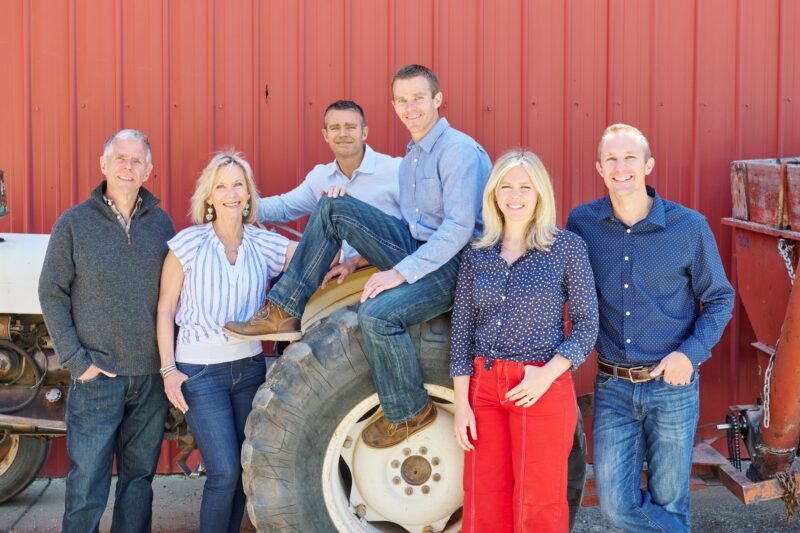Last Updated on September 4, 2025
We sat down with Heidi Diestel, 4th generation owner of Diestel Turkey Ranch, to discuss family legacy, industry challenges, and why creating the country’s first regenerative certified turkey deli meat took breaking 100 years of agricultural infrastructure.
You’re a 4th generation Diestel family farmer, was joining the family business always the plan?
Absolutely not. Growing up, I watched my parents work in this business and it takes 150%. You never have a day off. There’s always something going on, trucks moving about—it’s farming with scale, and it’s a lot. I was like, “I’m out of here. I am out.” I left and had a totally different career trajectory in health and wellness. But my husband saw this cool opportunity, and my brother Jason really needed help. Eventually I realized: would I rather put in my time doing something else, or would I rather go and produce food that nourishes people and is what fuels them every day? That totally won out.
What makes Diestel’s approach different in today’s industry?
We have a $70 billion organic industry, but if you look at that percentage of sales for meat seafood & poultry, we’re barely on the leaderboard—maybe 2% of all food produced in the country. And that’s after 30 years of our entire industry pounding the pavement and shouting from the rooftops. Organic food hasn’t seen a “Got Milk” type campaign, right? Meanwhile, mega-large meat companies have massive support networks through the government. I don’t knock mega large conventional producers for what they do, but let’s make some space for people like Diestel to grow.
Tell us about your regenerative certification, what makes it special?
We’re producing the first regenerative certified turkey deli meat in the country, which is just mind-blowing. But here’s what’s unique about our approach: in poultry, if you’re going to be regenerative, the birds eat corn and soy as their main diet. We couldn’t be truly regenerative if we didn’t think about the off-farm impact and where that feed was coming from. That’s not a standard requirement for regenerative certification—that’s a unique Diestel expectation we put on ourselves.
That sounds complicated. How did you source regenerative feed?
It was wild. Normally, you go to an elevator that receives all the grain from farmers, and they give you what you need—organic, non-GMO, conventional, whatever. But when we wanted something as specific as regenerative certified, non-GMO project verified feed, the elevators said, “We’re not going to hold this and keep it separate for you.” So, my brother Jason literally went out to Illinois, met the corn farmer, saw the corn, saw how it was grown. We broke 100 years of infrastructure when sourcing the regenerative corn/soy. We started out buying 650 tons of corn, which sounds like a lot but is absolutely nothing in the industry, yet it’s massive for us to purchase and store for our feed mill.
What about product development? We heard the thick-slice deli meat took two years to perfect.
We will not produce a product that has our brand on it that we wouldn’t feed to our family. That’s our baseline. My parents still review every new item, they taste it and give us feedback. The thick slice was challenging because it’s very unique, very artisanal in shape. It’s not as consistent in form as typical deli meat, so there’s a lot of broken or odd shaped slices. But we wanted something as minimally processed as possible while still performing like deli meat. It took two years of tweaking everything from humidity levels in our ovens, thickness of our slicers, and packaging to showcase the thicker slice.
How does working with family affect these decisions?
Working with family is intense. We all work hard to have a high degree of emotional intelligence because we need to be able to say something sucks without World War Three at the dinner table. We can say, “Hey, you’re not pulling your weight, or this project isn’t working,” and we may not love the feedback, but we hear it, we create space to solve the problem at hand and we move on. It’s a healthy working relationship, though I won’t lie, it’s intense.
You mentioned nutrient density studies. What did you discover?
We started doing research with the state of Utah, comparing the nutrient density in our products to the leading national brand’s products. What we have found is that all Diestel products compared have a higher overall nutrient density than the national leading brand. We feel this is largely due to maintaining really high-quality feed and providing a clean, chemical free environment for the birds. My mom is a registered dietitian, so we were raised understanding that feed has a huge impact on the birds’ performance, taste, and texture. It was incredibly validating to see that in data.
Why is partnering with companies like ButcherBox important for producers like you?
It’s super challenging from a farmer’s perspective to take all this risk—buying more expensive feed, breaking all the rules, which is always more expensive—and hope someone wants to buy it. We know regenerative products are valuable to Gen Z and the next generation of shoppers, but we still need partners like ButcherBox to amplify that story. When ButcherBox says, “Yeah, we’ll sign up for this and support you,” that’s what allows us to scale these programs and create outlets for corn and soy farmers who want to transition to regenerative practices.
What’s your message to consumers about the future of food?
We’ve all put our heads down in this industry and just worked with a “leave us alone, let us do what we do” attitude. But I’m realizing that if we’re going to continue to have a market, we must speak up more. When I see the attrition rate of farmers, it’s absolutely alarming. We need more independent farmers producing our food in this country and it will take more than just Diestel. Equally it’s going to take consumers to vote with their food dollars supporting products like ours to keep farms like us in business.
Kerin Norton is the Head of PR and Content Strategy at ButcherBox.



